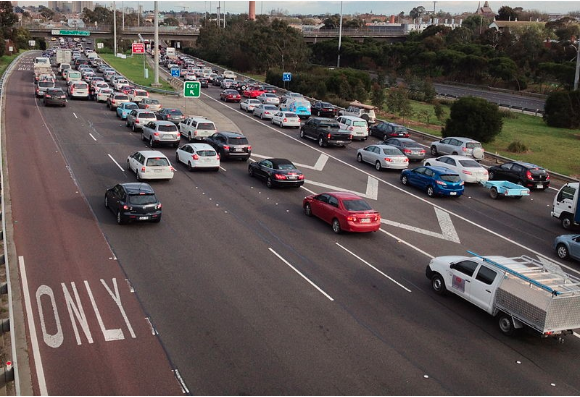Road charges could ease Melbourne’s gridlock, research shows

Charging drivers at peak times could be the best way to help ease Melbourne’s traffic woes, according to new research by the University of Melbourne.
In a working paper, Can Road Changes Alleviate Congestion, researchers Dr Leslie Martin and Mr Sam Thornton, from the Faculty of Business and Economics, analysed the economic and social impact of different charges levied on road use in Victoria.
“If designed well, road use charges could help reduce traffic congestion by encouraging people to drive at different times, take alternative routes or use other modes of transport,” Dr Martin said.
The researchers evaluated the results of Transurban’s 2015-2016 Melbourne Road Usage Study that looked at the travel behaviour of 1400 motorists over an eight-to-10-month period.
Using a system of credit accounts, drivers were subject to three different road charge options:
- Distance-based charges: motorists were charged a constant 10 cents per kilometre fee.
- Distance plus cordon charges: motorists were charged a constant rate of eight cents per kilometre, plus an additional $8 fee if they travelled into the central CBD zone, an area bounded by Alexandra Parade and Elliot Avenue to the north, CityLink to the west and south, and Hoddle Street to the east.
- Time-of-day charges: motorists were charged 15 cents per kilometre at peak times during weekdays and eight cents per kilometre at all other times.
The study found a charge on distance travelled reduces driving primarily at off-peak times, but does little for traffic congestion overall.
Further research is needed to assess the potential effects of the cordon on traffic as few drivers entered the CBD zone during the study. However, charges that vary according to the time of day did reduce congestion.
“We found that drivers who were subject to a higher cost of driving between the peak hours of 7am to 9am and 3pm to 6pm on weekdays reduced travel by 10 per cent during these periods. These reductions relieved pressure on local congested roads,” Dr Martin said.
The study did not find any evidence that in the short-term road use charges would encourage drivers to increase their use of public transport.
“Instead we found that motorists responded by being more strategic with their time on the road by linking their trips together,” Dr Martin said.
Dr Martin and Mr Thornton said the research demonstrates that vulnerable groups could win under congestion-based fees.
“Our study shows that low-income drivers are the most responsive to road use charges. They are also least likely to contribute to congestion in and around the cordon area,” Master’s candidate Mr Thornton said.
“If charges are appropriately targeted at congestion then there is the potential to better use existing infrastructure, thereby reducing costs while simultaneously generating revenue for necessary infrastructure investments."